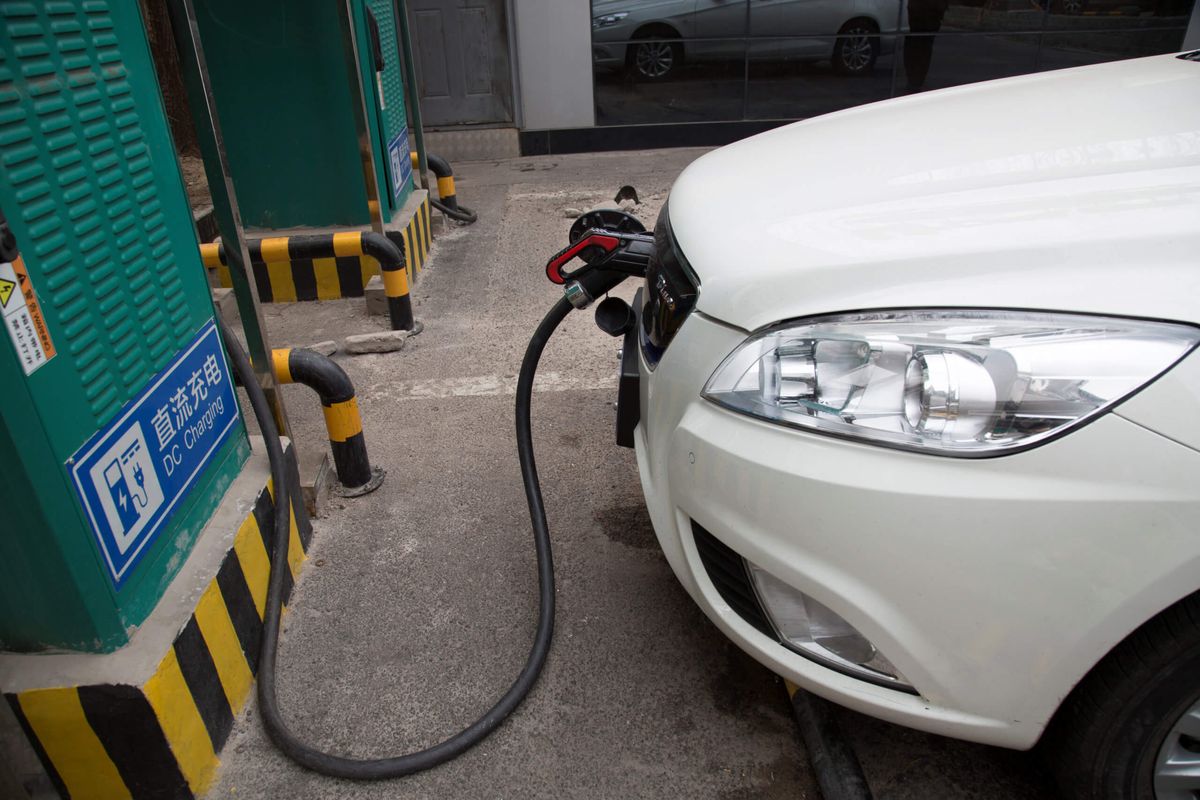China’s push into the electric vehicle industry

A few minutes every morning is all you need.
Stay up to date on the world's Headlines and Human Stories. It's fun, it's factual, it's fluff-free.
China has made a point of investing in the EV industry. The world’s largest car market produces more than 50% of the world’s electric vehicles, dwarfing American EV production.
US$12,000 is a lot to pay for a license plate. But if you want to own a car in Shanghai, there are few other choices. Recent years have seen a push to reduce traffic in the Chinese metropolis that is home to more than 20 million. Shanghai isn’t the only city to introduce such strict measures. In Beijing, one must win a lottery in order to obtain the coveted license plate needed to drive.
If you live in a high-traffic megacity like Beijing or Shanghai, the prospect of obtaining a license plate is at best financially damaging and at worst like winning the lottery – unless you’re willing to drive an electric vehicle (EV). For those drivers in the market for an EV, the high cost for obtaining a license plate is waived and the likelihood of receiving one is much more likely.
Why are Chinese consumers buying EVs?
China has made a point of investing in the EV industry. The world’s largest car market produces more than 50% of the world’s electric vehicles, dwarfing American EV production. Chinese consumers are also more willing to purchase the futuristic vehicles, again dwarfing their American counterparts in the same category.
While the motivations for owning an electric vehicle in the US may range from environmental consciousness to the prestige that surrounds Tesla, Chinese consumers are recipients of government subsidies.
Electric vehicles in America are still subject to high cost and range anxiety. That’s not the case in China. While the MSRP (Manufacturer’s Suggested Retail Price, also known as the “sticker price”) of EVs rolling off the factory line may be just as costly as those in America, subsidies and tax breaks significantly reduce the cost to Chinese users wanting to buy one.
This is also made possible because of the large number of EV startups China hosts. China is home to dozens of electric car companies like Nio Inc. and BYD Auto Co. Ltd. with dozens of potential products ranging in price. Some EVs may be luxury cars competing with Tesla for the upper-income market, while other companies sell rudimentary autos that cost no more than US$5,000.
Why is China investing in EVs?
The motivations for the Chinese government’s investment in the EV industry ranges. Initially, one might think that it has to do with that nation’s notorious pollution challenges. Reducing smog in large cities is a benefit, but it is not the primary motivation.
Another reason is strategic. While China is rich in rare earths, it doesn’t have many oil deposits. Much of China’s oil must be imported, mostly through the South China Sea, which makes it vulnerable to a blockade from the US. But, like pollution, this is also a secondary benefit.
The primary motivation for investing so much in the EV industry stems from China’s desire to dominate the future auto market. With the nefarious effects of climate change and the coming specter of oil depletion, many nations are implementing policies that will phaseout the sale of gas-powered cars.
Countries such as Ireland and Germany plan to retire the sale of traditional vehicles in coming years. Recently in the United States, California announced plans to ban gas-powered car sales starting in 2035. With this future in mind, China has poured money into EV startups that produce electric cars, busses and other common vehicles with hopes of a future that sees Ford and Volkswagen replaced with BYD and NIO.
Challenges remain
While China has done much for their EV industry, they are facing challenges. Foreign automakers like Tesla Inc., the Ford Motor Company and Volkswagen AG have also entered China’s EV market and are currently outperforming their Chinese counterparts since foreign brands in China outsell Chinese brands.
Initially, foreign EVs weren’t subject to the same government incentives that homegrown vehicles had, but as companies like Tesla have built factories in China, they have become subject to many of the same subsidies that Chinese electric automakers have. When compared to foreign brands, Chinese companies lose, as domestic companies lack the prestige that established foreign brands have.
To make matters worse for Chinese EV makers, some of the subsidies for buying electric vehicles have been rolled back. With the withdrawal of those subsidies have come a decline in EV sales. And while American and European automakers have come to compete in the Chinese market, Chinese electric automakers are struggling to enter Western markets.
Still, the Chinese government is striving to normalize EVs. One place where this is on display is Shenzhen, where the entire public transit fleet has been electrified, giving that city more electric busses than every other non-Chinese city combined. The taxi system too has gone electric, much to the chagrin of some of the drivers who complain of long lines to recharge and a longer recharging time.
What now?
Even in China, where the government has invested heavily in EVs, most consumers still drive traditional gas vehicles. The age of the electric vehicle is still decades away and in the era of the digital revolution and globalization, it’s nearly impossible to predict what the world – and the market – will look like in 40 years. But if the world continues on the trajectory it’s on and the age of EVs does arrive, China is making sure that when you push the ignition button in your car, it starts a Chinese vehicle.
Have a tip or story? Get in touch with our reporters at tips@themilsource.com




Comments ()